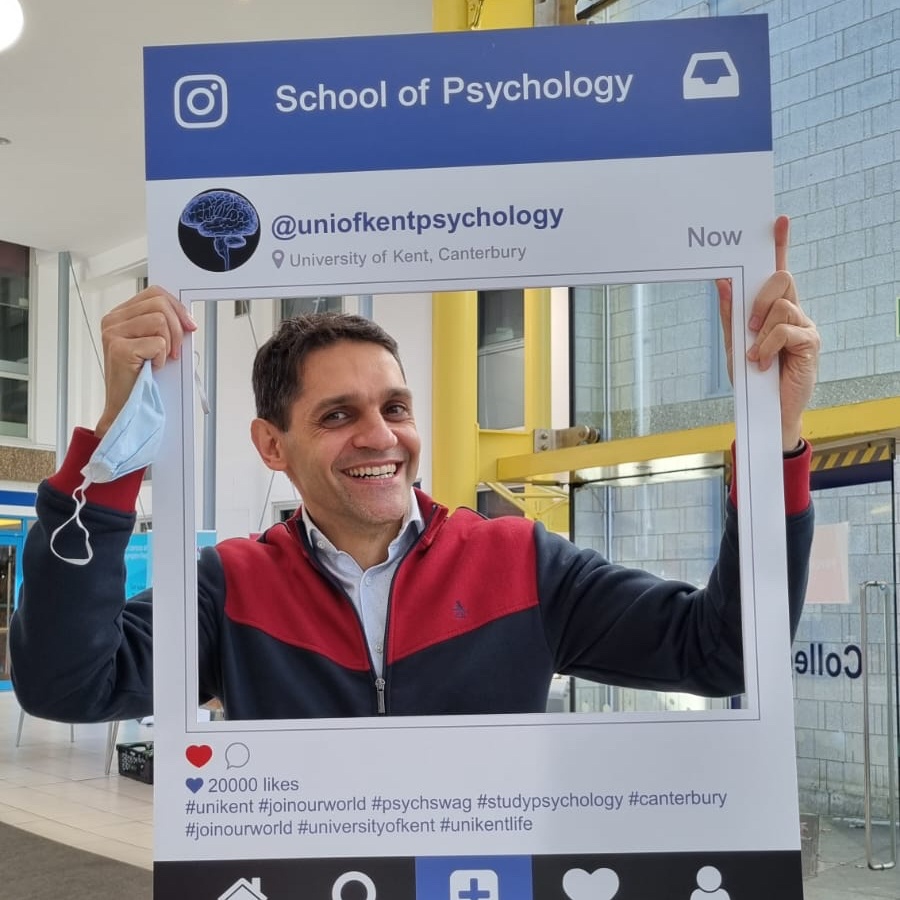
Dr Amir-Hamayoun Javadi is a pioneer in the field of cognitive and neuropsychology, publishing multiple articles that further advance the field of music and memory interventions. In this blog, Amir shares his experiences as a researcher and lecturer at Kent.
Dr Amir-Homayoun Javadi is a Senior Lecturer in Cognitive Psychology/Cognitive Neuroscience amongst other key roles in Kent’s School of Psychology. His research interests involve non-pharmacological enhancements of learning, memory, and decision-making. He achieves this through various intervention approaches; and is skilled in various computational (e.g. modelling and artificial intelligence) and imaging techniques (e.g. EEG and eye-tracking)
What makes you proud to work at the School of Psychology at Kent?
The students; the more I talk with the students, the more I come to appreciate them. Every year I witness their growth, from the 1st year to the final year. I see them begin to understand the world around them more and have a better insight into psychology. All of the students who I have supervised are now very busy with their careers as PhD students and research assistants at universities, as therapists in hospitals, as teachers in schools for children with learning disabilities… I am super proud of all of them.
What are the facilities and labs like?
The School of Psychology and University of Kent is unique in that sense because we have a lot of lab space considering the number of students we have. My studies are very lab-intensive; such as neuroimaging, physical exercise and sleep labs. My students spend a lot of their time in the labs to collect data. Of course, we share all the facilities across the school, but I have never had any issues with lab access for my students.
What are some examples of roles that graduates have gone on to taking up?
As I said earlier, many of those have continued in academia as MSc, or PhD students (such as at UCL, Kings and Royal Holloway), or joined research labs as research assistants (such as at UCL and Nottingham). Two of my students are now studying towards their medical and nursing degrees. A few of my students are now in NHS settings working with patients such as those with mental health issues or strokes.
How has technology affected the course/discipline recently?
We have relied heavily on technology in the past two years: partly to deliver our lectures online, and partly to continue our research online. Thankfully at Kent we have a fantastic IT team that helps academics and students with various IT problems. In our school, we have a dedicated team of programmers to help final year undergraduate and postgraduate students with their projects. So, I would say, while we adjust technology to fit our needs, to a great extent we have to adjust our expectations based on the limits of technology to perform our everyday tasks. And I have to say I rarely felt constrained in my job.
What new developments are there in this discipline that interest you?
Perhaps the most interesting part at the moment is the application of big data: like when you have 500-600 brain scans of individuals with or without different diseases (such as Alzheimer’s disease) and you model the data to recognise and predict different diseases. I have to say that while I was aware of these developments, it was the lockdown that made me take a closer look at such research and now I have three papers in different phases of review and publication.
What would you say the best aspect about living in Kent is?
Kent is a lovely county with a lot of places to visit. Canterbury, in particular, is very nice: it is in a fantastic location and you can get buses to all the coastal cities, you can cycle for 30 minutes and you are in the middle of a forest, and of course, it is very close to London (only a 1hr train journey). The university campus is also lovely with a lot of green spaces, a gym, restaurants, a cinema and a club.
Learn more about our Psychology BSc (Hons) and Cognitive Psychology / Neuropsychology MSc courses at Kent.




